
The Foreign Intelligence Service of the Russian Federation or SVR RF is Russia's external intelligence agency, focusing mainly on civilian affairs. The SVR RF succeeded the First Chief Directorate (PGU) of the KGB in December 1991. The SVR has its headquarters in the Yasenevo District of Moscow with its director reporting directly to the President of the Russian Federation.

Alexander Mikhailovich Orlov, was a colonel in the Soviet secret police and NKVD Rezident in the Second Spanish Republic. In 1938, Orlov refused to return to the Soviet Union due to fears of execution, and instead fled with his family to the United States. He is mostly known for secretly transporting the entire Spanish gold reserves to the USSR in exchange for military aid for Spanish Republic and for his book, The Secret History of Stalin's Crimes.

Active measures is a term used to describe political warfare conducted by the Soviet Union and the Russian Federation. The term, which dates back to the 1920s, includes operations such as espionage, propaganda, sabotage and assassination, based on foreign policy objectives of the Soviet and Russian governments. Active measures have continued to be used by the administration of Vladimir Putin.

The First Main Directorateof the Committee for State Security under the USSR council of ministers was the organization responsible for foreign operations and intelligence activities by providing for the training and management of covert agents, intelligence collection administration, and the acquisition of foreign and domestic political, scientific and technical intelligence for the Soviet Union.

Iosif Romualdovich Grigulevich was a Soviet secret police (NKVD) operative active between 1937 and 1953, when he played a role in assassination plots against Communist and Bolshevik individuals who were not loyal to Joseph Stalin. This included the murders of claimed and actual Trotskyists during the Spanish Civil War including Andreu Nin Pérez, and an initial, failed assassination attempt against Leon Trotsky in Mexico.
The "Mitrokhin Archive" is a collection of notes and documents which were secretly made, smuggled, and hidden by the KGB archivist Vasili Mitrokhin during the thirty years in which he served as a KGB archivist in the foreign intelligence service and the First Chief Directorate. When he defected to the United Kingdom in 1992, he brought the archive with him, in six full trunks. His defection was not officially announced until 1999.

On 7 October 2006, Russian journalist, writer and human rights activist Anna Politkovskaya was shot dead in the elevator of her apartment block in central Moscow. She was known for her opposition to the Chechen conflict and for criticism of Vladimir Putin. She authored several books about the Chechen wars, as well as Putin's Russia, and received several international awards for her work. Her murder, believed to be a contract killing, sparked a strong international reaction. Three Chechens were arrested for the murder, but were acquitted. The verdict was overturned by the Supreme Court of Russia and new trials were held. In total, six people were convicted of charges related to her death.
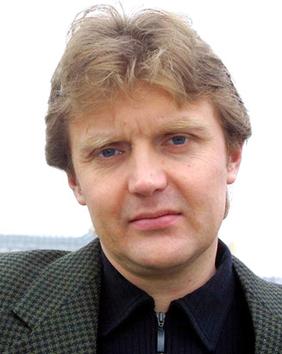
Alexander Valterovich Litvinenko was a British-naturalised Russian defector and former officer of the Russian Federal Security Service (FSB) who specialised in tackling organised crime. A prominent critic of Russian President Vladimir Putin, he advised British intelligence and coined the term "mafia state".

Yuri Petrovich Shchekochikhin was a Soviet and later Russian investigative journalist, writer, and liberal lawmaker in the Russian parliament. Shchekochikhin wrote and campaigned against the influence of organized crime and corruption. His last non-fiction book, Slaves of the KGB, was about people who worked as KGB informers.
Anatoly Vasilyevich Trofimov was a head of the Soviet KGB investigation department. He personally supervised all Soviet dissident cases including Sergei Kovalyov, Gleb Yakunin, Alexey Smirnov, and Yuri Orlov. He was later a deputy director of the Russian Federal Security Service and became a mentor and supervisor of Alexander Litvinenko. He was assassinated in April 2005 by unidentified gunmen in Moscow.
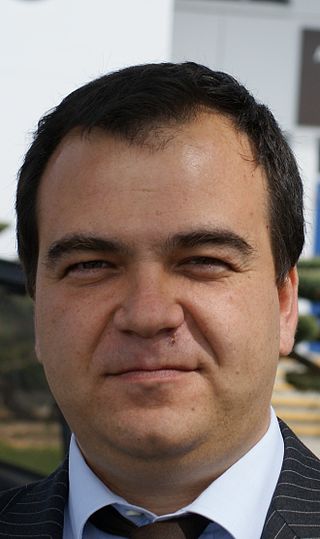
Mario Scaramella is a lawyer and security consultant. He came to international prominence in 2006 in connection with the poisoning of the ex-Federal Security Service (FSB) agent Alexander Litvinenko. As responsible for intelligence analysis and production on KGB and military GRU espionage in Europe, he served as an investigator and adviser to the Mitrokhin Commission. Scaramella was a suspect by the Italian justice department for calumny.
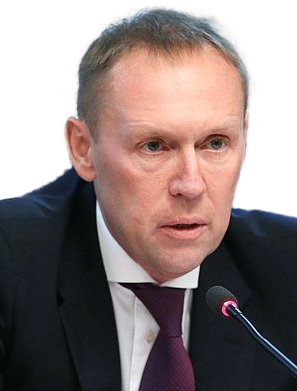
Andrey Konstantinovich Lugovoy, also spelled Lugovoi, is a Russian politician and businessman and deputy of the State Duma, the lower house of the Russian parliament, for the Liberal Democratic Party of Russia. He worked as a KGB bodyguard and as head of "Ninth Wave", a security firm.
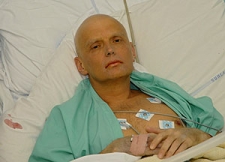
Alexander Litvinenko was an officer of the Russian Federal Security Service (FSB) and its predecessor, the KGB, until he left the service and fled the country.

Lubyanka Criminal Group is a book by Alexander Litvinenko about the alleged transformation of the Russian Security Services into a criminal and terrorist organization.
The poison laboratory of the Soviet secret services, alternatively known as Laboratory 1, Laboratory 12, and Kamera, was a covert research-and-development facility of the Soviet secret police agencies. Prior to the dissolution of the Soviet Union, the laboratory manufactured and tested poisons, and was reportedly reactivated by the Russian government in the late 1990s.
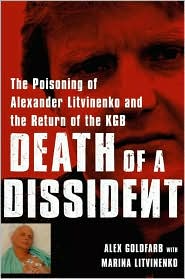
Death of a Dissident: The Poisoning of Alexander Litvinenko and the Return of the KGB is a book written by Alexander Goldfarb and Marina Litvinenko about the life and death of her husband, former FSB officer Alexander Litvinenko who was poisoned by the radioactive element polonium in London in November 2006.

Bohdan Mykolayovych Stashynsky or Bogdan Nikolayevich Stashinsky is a former Soviet spy who assassinated the Ukrainian nationalist leaders Lev Rebet and Stepan Bandera in the late 1950s. He defected in West Berlin in 1961.
Arnold Deutsch (1903–1942?), variously described as Austrian, Czech or Hungarian, was an academic who worked in London as a Soviet spy, best known for having recruited Kim Philby. Much of his life remains unknown or disputed.
Nicholas George Shadrin, born Nikolai Fedorovich Artamonov, was a Soviet naval officer serving in Gdynia, Poland who defected to the United States of America in 1959.
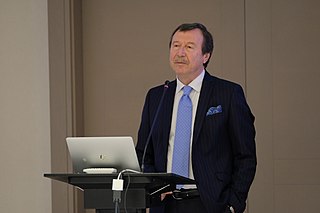
Boris B. Volodarsky is an English historian, Fellow of the Royal Historical Society, specialising in Intelligence History, which he has studied for almost 30 years after having moved to the West, and the history of the Spanish Civil War. He formerly served as a captain in the Spetsnaz GRU, a Russian special forces unit.
















